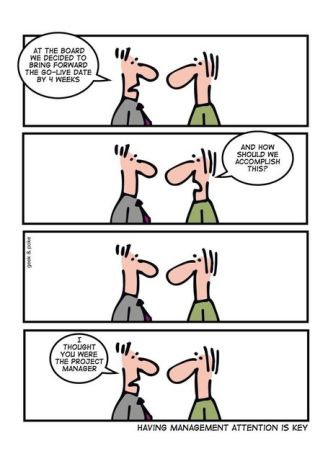 You have a project and now you need someone to lead it, a project manager. Unless your business is project management or you have an in-house solutions group with project managers, usually called the Project Management Office (PMO), your best bet is contracting for your short-term need.
You have a project and now you need someone to lead it, a project manager. Unless your business is project management or you have an in-house solutions group with project managers, usually called the Project Management Office (PMO), your best bet is contracting for your short-term need.
There are several questions you might ask when considering spending money to contract a professional project manager, this is especially true if you implementing new software and have engaged a ‘partner’. By the way, your partner will often advise against this route as they have assigned their project manager to lead the effort, their RACI (Responsible, Accountable, Consulted, Informed) Chart will show your Business Lead in the place of a Project Manager. My advice to you, despite your ‘partner’ is as follows:
- You need a professional project manager to support your efforts and represent you in the review and execution of all activities you are responsible for during the course of the project.
- You need a professional project manager to review all work products, deliverables and tollgates represented in the SOW (Statement of Work), on the WBS (Work Breakdown Structure) and translated to the project schedule for which both you and the ‘partner’ are individually or jointly responsible.
- You need a professional project manager to identify and resolve issues and risks as they occur during the project, especially where there are disputes between parties.
- You need a professional project manager to work with the ‘partner’ to resolve resource loads, schedule updates, project delays and other activities, which may translate into, budget changes.
The right project manager should come with several credentials and fit your organizational culture, remember this person will represent you and will be speaking for you. Finding the right project manager will require tenacity and a plan. Settling for what you can find that fits your budget will not serve you in the long run as this will only lead to unmitigated risk.
Here is the plan for contracting project managers:
- Define the high-level project scope. This provides you with an understanding of your internal requirements and business expectations.
- Document your Steering Committee and other key players within your organization who will be associated with the project. This is a critical step as the personality of the PM will be a critical success factor. Trite? Maybe but ultimately their ability to interact successfully with different people will make or break the project, the last thing you need is to replace your PM mid-stream. Remember, the PM is part of your team.
- Research the market; find a trusted adviser who can support your search and who doesn’t sub-contract their search. There are thousands of fly-by-night organizations out there today. The last thing you want is three layers between the organization you pay and the organization that pays your contractor. There are far too many stories of contractors walking off jobs for non-payment of invoices.
- Establish your minimum acceptable credentials for the Project Manager. The following are what any project manager should have: (a) Certification in at least one of the accepted standards (PMI, PRINCE2) (b) Minimum of 3 full life-cycles of project management experience within project type you are proposing (technology, construction, etc) (c) Some business management experience is helpful (d) Minimum of BA/BS degree (e) References from past clients, Team Members, Peers
- Set an interviewing process including situational interviewing. Provide candidates
 specifics of the project and request they solve a problem or issue as part of the interview process. This provides you with insight into how candidates approach problem solving and pressure situations: (a) If your goal is to stay within your budget +/- 10% ask the candidates for an example of where they worked with specific constraints and how they managed partners and internal budget reporting, ask for result orientations; (b) Everyone has failures, ask about a failure and gauge the answer.
specifics of the project and request they solve a problem or issue as part of the interview process. This provides you with insight into how candidates approach problem solving and pressure situations: (a) If your goal is to stay within your budget +/- 10% ask the candidates for an example of where they worked with specific constraints and how they managed partners and internal budget reporting, ask for result orientations; (b) Everyone has failures, ask about a failure and gauge the answer. - If your organization does not have a mature PMO include requests for examples of templates, strategies and tools. This is another critical success factor for the project. You will want to ensure the candidate has a thorough understanding of project management from initiation to close.
- Have a Project Management Statement of Work prepared prior to initiating interviews. If you have never contracted for project management you will want to consider the framework of the project and your requirements for this document, another reason to work with a trusted adviser as your contract agency. My recommendation would be the PMI framework; however Prince2 is equally good for defining the Project Management deliverables. Key to ensuring the Statement of Work is sound is working with the final candidate to agree on the deliverables, work-products and timeline that will get you the end result you desire.
You should be looking for a project management candidate that fits your culture and can perform a function that no one in your organization today is able to provide. The candidate should be able to drive tasks to completion, report on deliverables, lead teams, and deliver a successful project. Ultimately a professional project management consultant will leave you with knowledge, skills and intellectual capital that will enable the organization to perform the tasks in the future.
Last but certainly not least, project management is equal parts science and art; look for a project manager capable of thinking outside of the box and juggling multiple activities during the course of work day .
Consider how well they communicate with you during the interview process is their answer rote? Do you feel as if they are reading from a script or are they considering your questions and providing answers with some thought behind them? Did they ask questions of you, offer suggestions during the interview? Did they provide information about their background or experience you didn’t ask for but gave you insight into how they work?
All of the techniques, tools and strategies we learn over the years; all of the science of Project Management does not make a great project manager. Our ability to apply these, with humor and sensitivity in even the most high-pressure situations, that is what makes us good if not great at our jobs. When looking to bring a project manager into your organization, look for those gems who love what they do and despite how hard their jobs can be, still invest and keep coming back for more.


